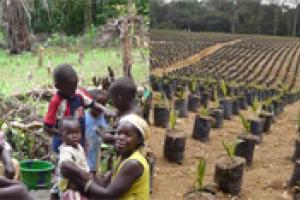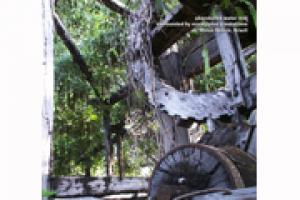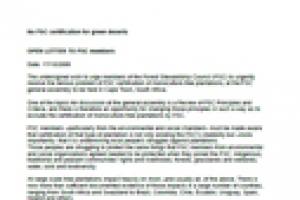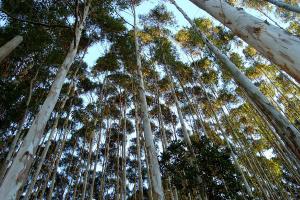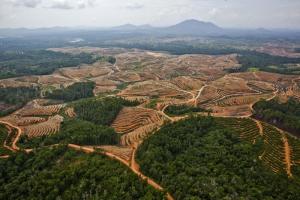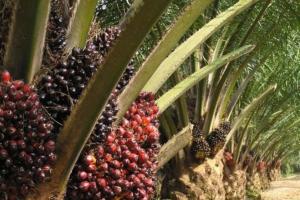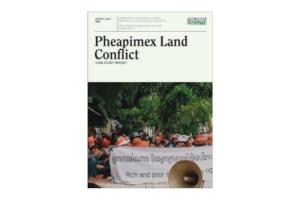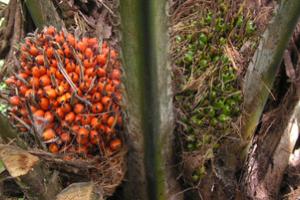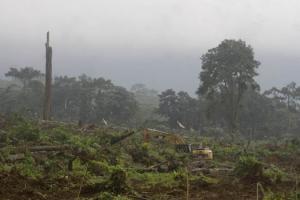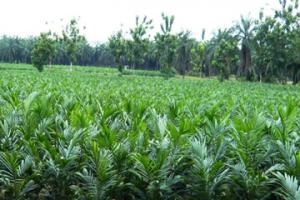Also available in French
We, members of communities affected by industrial monoculture oil palm plantations, including peasant movements, as well as other civil society organizations from Africa, Europe, the Americas and Asia, and signatories to this declaration, met from 2 –5 November 2013 in Calabar, Cross River State, Nigeria,
Large-Scale Tree Plantations
Industrial tree plantations are large-scale, intensively managed, even-aged monocultures, involving vast areas of fertile land under the control of plantation companies. Management of plantations involves the use of huge amounts of water as well as agrochemicals—which harm humans, and plants and animals in the plantations and surrounding areas.
Publications
29 September 2013
For many years WRM has been denouncing the FSC certification of monoculture tree plantations. The scale of these monocultures is one of several reasons for such opposition. Large-scale tree plantations occupy vast areas of land leading to displacement of communities, they consume huge amounts of water and soil nutrients and require enormous amounts of agrochemicals. These characteristics make them intrinsically unsustainable and therefore they can’t be certified as ‘sustainable’.
Other information
21 September 2013
Only available in Spanish -
Other information
20 September 2013
New York, US - On 21 September, the International Day of Action against Monoculture Tree Plantations [1], organizations, forest dependent communities, and Indigenous Peoples from around the globe will denounce industrial tree plantations due to their devastating social and ecological impacts.
Bulletin articles
11 September 2013
Here in Indonesia, ever since a child entered the school, he/she has been familiar with “Merauke” through a patriotic song entitled “Dari Sabang Sampai Merauke” (lit. from Sabang to Merauke – from the westernmost to the easternmost part of Indonesia). The song talks about the unity and glory of Indonesia across its large and small islands reaching from Sabang, the westernmost part, to Merauke, the easternmost.
Bulletin articles
11 September 2013
Few places in Southeast Asia can match the distinction of Palawan, in the Philippines. This is home to seven protected areas, a declared “Game Refuge and Bird Sanctuary” since 1967 and a “Mangrove Reserve” since 1981. UNESCO declared the whole Province a ‘Man and Biosphere Reserve’ in 1990.
Bulletin articles
11 September 2013
The company promised to increase forest cover but they planted cassava; cassava is not a tree; a cassava plantation is not a forest.
(Resident from Ansar Chambor, Pursat, Cambodia)
Bulletin articles
11 September 2013
Other information
11 September 2013
"Expansion of palm oil in the Brazilian Amazon: an analysis of impacts on family farm in north-eastern Pará"
Reporter Brazil – Organization for Communication and Social Projects’s Biofuel Watch Center
Download here: http://reporterbrasil.org.br/documentos/pamoil.pdf
Bulletin articles
11 September 2013
In one of his last works – “Oil palm in Africa: Past, present and future scenarios”, published in December 2010 – our beloved friend and colleague Ricardo Carrere provided an overview of the history and current status of monoculture oil palm plantations in Africa (see http://wrm.org.uy/oldsite/countries/Africa/Oil_Palm_in_Africa.pdf).
Bulletin articles
11 September 2013
